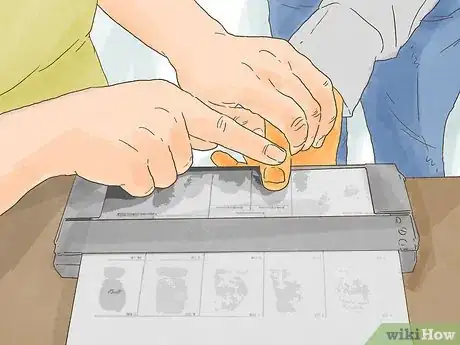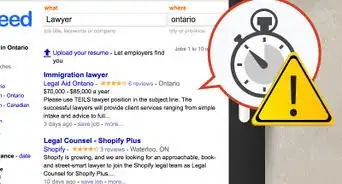This article was co-authored by wikiHow Staff. Our trained team of editors and researchers validate articles for accuracy and comprehensiveness. wikiHow's Content Management Team carefully monitors the work from our editorial staff to ensure that each article is backed by trusted research and meets our high quality standards.
There are 11 references cited in this article, which can be found at the bottom of the page.
wikiHow marks an article as reader-approved once it receives enough positive feedback. In this case, 97% of readers who voted found the article helpful, earning it our reader-approved status.
This article has been viewed 60,499 times.
Learn more...
If you like to travel and find people, then being a process server in California can be a great career. Process servers deliver legal documents to people involved in court cases. In California, process servers must register with the county clerk’s office in the county where they reside. However, once registered, you can serve papers anywhere in the state. Your certificate is good for two years.
Steps
Checking If You Qualify
-
1Be a California resident. You must have lived in the state for at least one year immediately preceding your application to become a process server. If you haven’t satisfied this requirement, then wait.[1]
- Corporations and partnerships must also register if they earn any money from serving legal papers. They must have continuously existed for at least one year immediately before they apply.[2]
-
2Check your criminal history. You can’t register as a process server if you have a felony conviction.[3] Check your criminal history record to confirm that you meet this requirement.
- If you have a criminal history, then a judge in the county will need to review your file. You might still be able to work as a process server if you have a pardon, expungement, or certificate of rehabilitation.[4]
Advertisement -
3Meet the age requirement. You must be at least 18 years old in order to work as a process server in California.[5] If you don’t meet this requirement, you should wait before applying.
- The age limit applies even if you work for a company. For example, you can’t be 17 but serve papers for a process server corporation.
-
4Register if you'll serve more than 10 papers annually. Technically, you don’t have to register if you only want to serve a few papers a year. However, state law does require registration if you serve more than 10. Estimate how much service you will do.
- If you’re a corporation or partnership, each employee who serves more than 10 papers must individually register as a process server.
Completing Requirements
-
1Obtain two headshot photos. You’ll need two photographs if you are filing an initial registration. Your photographs should be 1”x1”. If you’re a corporation or partnership, you don’t need a photograph.[6]
- You may be able to have the headshots taken at the county clerk’s office for a fee. Call ahead of time to check.[7]
-
2Fill out a registration form. You can download the form from your county clerk’s website, or you can stop in and pick up a paper copy. There are separate forms depending on whether you are registering as an individual or as a corporation/partnership.[8]
- Fill out the form but do not sign. You’ll sign in front of the court clerk.
-
3Have fingerprints taken. You’ll need to give fingerprints so the county can confirm you don’t have a felony conviction.[9] If you are registering as a corporation or partnership, then all officers or partners must have fingerprinting done.[10] In most counties, you’ll give Livescan fingerprints, but some counties still use fingerprint cards. Contact your county office for details.
- Generally, you’ll need to fill out a form to request the fingerprints. The form should be available from your county’s website.[11]
- You’ll probably have fingerprints taken at your local law enforcement agency. Check whether you need to pay your fingerprinting fee at the time you have fingerprints taken.
-
4Get a surety bond. You need to post a $2,000 bond. Research bonds online or contact a surety company. The bond must be good for the two years after you register. Typically, you’ll need to pay $50 for a $2,000 bond.[12] A surety bond is not an errors and omissions policy, so don’t confuse the two.
- You might have to wait several weeks for your fingerprinting appointment, so you should hold off on buying the bond until you’ve been fingerprinted. Your bond must run for the entire two-year period that your process server certificate is valid.
- Depending on your county, you may be able to make a cash deposit instead of posting a bond. Check with your county. For example, San Bernardino county will keep your cash deposit for three years after your registration expires.
Registering With Your County
-
1Visit your county clerk’s office. Take your registration form and a valid, government-issued photo identification, such as your driver’s license or passport.[13] Go the county where you reside or, if you are a corporation or partnership, where you have your principal place of business.
- You may need to schedule an appointment first. Check your county clerk’s website to see.[14]
-
2Sign your registration under penalty of perjury. Individuals can sign for themselves. If you are a corporation, then at least two corporate officers will need to sign. At least two partners must sign for a partnership.[15]
-
3Pay your fee. Call ahead of time to check how much you will pay and what are acceptable methods of payment. Generally, it costs $134 to register as a process server, but each county will set its own fee.[16]
-
4Renew in a timely manner. Your certificate of registration is good for two years or until your bond expires, whichever is first. If you want to renew, you will need to submit one photo. You can renew up to 60 days before the registration expires.[17]
- If you miss the deadline, you’ll need to have new fingerprinting completed.
Community Q&A
-
QuestionAre they independent contractors? What's the approximate pay per transaction?
 Community AnswerMost process servers are independent contractors. You should check with other servers in California to see how much they charge.
Community AnswerMost process servers are independent contractors. You should check with other servers in California to see how much they charge. -
QuestionHow much does a process server make per transaction?
 Community AnswerIt's dependent on what you are doing and what papers you are serving. Normally you will make $15 a serve, $25 an hour for stake outs (+extra $25 for short notice within 2 hours of filling), and +$25 for a successful serve.
Community AnswerIt's dependent on what you are doing and what papers you are serving. Normally you will make $15 a serve, $25 an hour for stake outs (+extra $25 for short notice within 2 hours of filling), and +$25 for a successful serve. -
QuestionHow do you get paid?
 Community AnswerThis is up to you. You can have clients pay you with a credit card, cash, or personal check. If you want to accept credit cards, you should contact your bank to set up a merchant account.
Community AnswerThis is up to you. You can have clients pay you with a credit card, cash, or personal check. If you want to accept credit cards, you should contact your bank to set up a merchant account.
References
- ↑ http://www.ccr.saccounty.net/Pages/ProcessServer.aspx
- ↑ https://arcc.sdcounty.ca.gov/Pages/professional-registration.aspx
- ↑ http://www.ccr.saccounty.net/Pages/ProcessServer.aspx
- ↑ https://www.serve-now.com/resources/become-process-server/california
- ↑ http://www.ccr.saccounty.net/Pages/ProcessServer.aspx
- ↑ https://www.sbcounty.gov/ARC/Main/RecorderClerk/ProcessServer.aspx
- ↑ https://arcc.sdcounty.ca.gov/Pages/professional-registration.aspx
- ↑ http://www.ccr.saccounty.net/Pages/ProcessServer.aspx
- ↑ https://www.serve-now.com/resources/become-process-server/california
- ↑ http://www.ocrecorder.com/services/certifications/server
- ↑ https://www.sbcounty.gov/ARC/Main/RecorderClerk/ProcessServer.aspx
- ↑ https://www.serve-now.com/resources/become-process-server/california
- ↑ https://www.sbcounty.gov/ARC/Main/RecorderClerk/ProcessServer.aspx
- ↑ https://www.sbcounty.gov/ARC/Main/RecorderClerk/ProcessServer.aspx
- ↑ https://arcc.sdcounty.ca.gov/Pages/professional-registration.aspx
- ↑ https://www.serve-now.com/resources/become-process-server/california
- ↑ https://www.sbcounty.gov/ARC/Main/RecorderClerk/ProcessServer.aspx
- ↑ https://www.serve-now.com/resources/become-process-server/california










































































